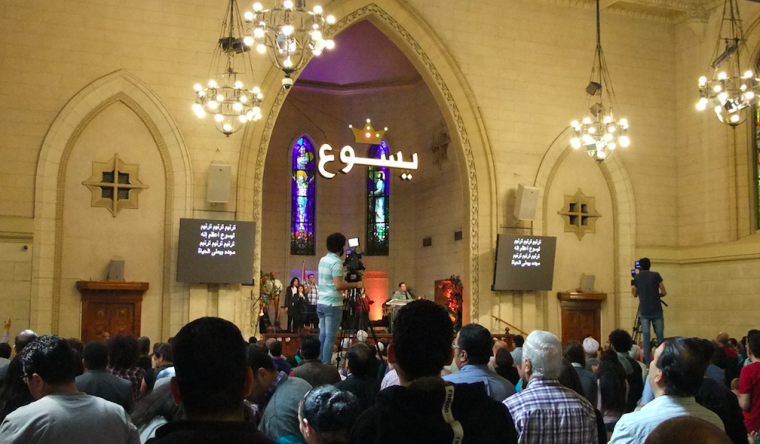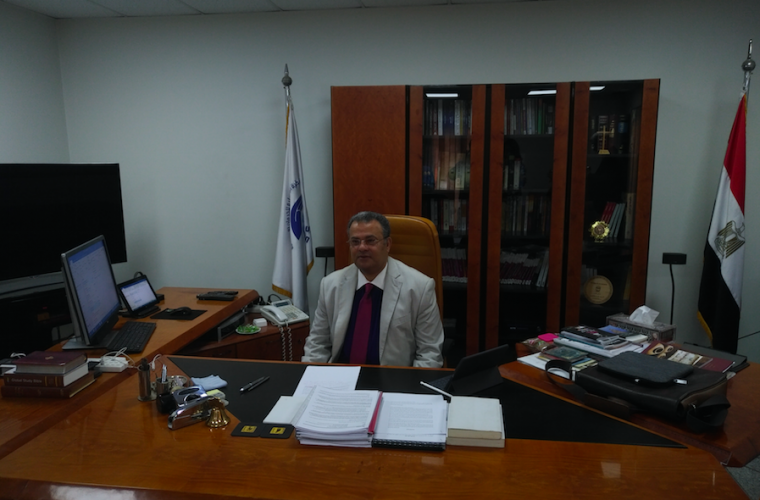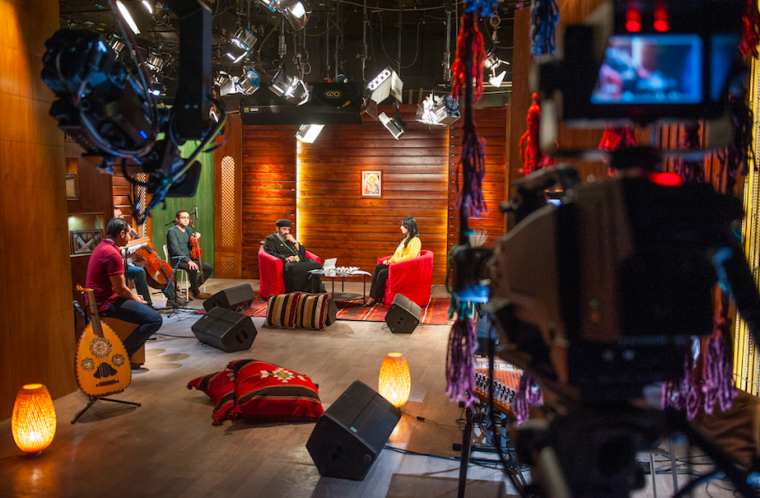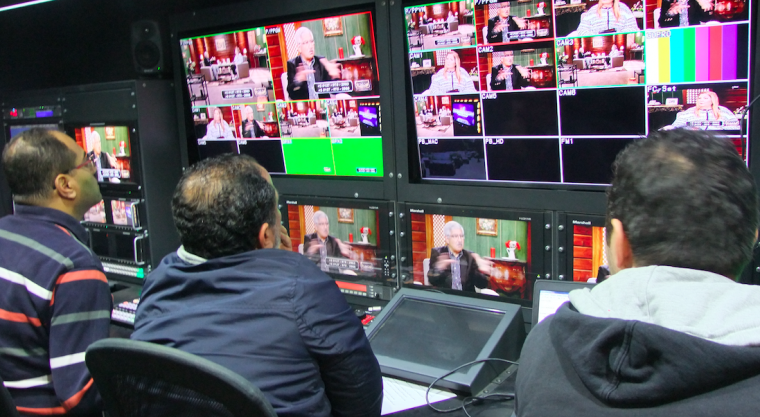Inside Egypt: How a Christian broadcaster is helping millions retain hope across the region
To get a flavour of how resilient the minority Christian community is in Egypt you could do worse than attend a service at the Kasr El Dobara Evangelical Church (KDEC) on Sheikh Rihan Street in downtown Cairo.
With more than a thousand Copts and Catholics, as well as Protestants of all ages and backgrounds, flocking to the church from all over the country, it becomes clear that churches in the West could learn a thing or two from this, the largest evangelical church in the Middle East.
True, it has all the hallmarks of evangelical worship familiar in the US and the UK, from the band on stage to the lengthy and impassioned sermon to the coffee and cakes after the service.
It even has the cameras: the worship is broadcast live by SAT-7, the UK-based charity and Christian satellite television network which boldly projects all kinds of shows to millions of Christians and others in 25 countries in Arabic, Farsi and Turkish across the Arab world in the Middle East and north Africa.

But what is different about this church – and SAT-7 – is the nature of the outreach. The church, which was founded in 1948, is attended by – and receives collections from – some 10,000 Christians over a rolling programme of services through the week. All the funds received go on giving to the community, and that means to the Muslim majority as well as the Christians who make up 10 per cent of the Egyptian population. The church runs some 24 drug rehabilitation clinics and ministers to all kinds of people in trouble, from children through sports programmes to single mothers to Syrian refugees and women caught up in sex trafficking and abuse.
None of this would be possible without the lively and generous congregations. After the service in his office upstairs, Pastor Sameh Hanna verifies that the mood is 'very, very good among Christians in Egypt' despite attacks on churches, including the Palm Sunday bombings which killed dozens in Alexandria and Tanta exactly a year ago today. 'If you attend this church you will see a crazy people shouting joyfully even though outside it is very dark. Faith – this is the secret of a joyful spirit,' he adds.
And over at the Coptic Evangelical Organisation for Social Services, Rev Dr Andrea Zaki, the president of that group and of the Protestant Community of Egypt, is an example of that spirit. Highly educated in Egypt, Canada, the US and – gaining a PhD in theology – at Manchester University, Zaki smiles when asked about the western church which he believes is 'collapsing' because of the weakness of its faith.

Liberal in his youth, he now describes himself as an 'open minded conservative Protestant' who has much in common with American evangelicals – though they divide on the issue of Israel, and the recent decision by Donald Trump, encouraged by US evangelical leaders, unilaterally to recognise Jerusalem as Israel's capital. In November, in a sign of the extent of their common ground, Zaki – with his dual identity as a strong evangelical and proud Arab – met with a delegation of those US evangelical leaders close to Trump, including the presidential advisory committee coordinator Johnnie Moore. 'We have the Bible in common,' Zaki says. But asked now if he voiced his objections to the US administration and evangelical leadership approach to Israel, he replies immediately: 'Yes, a hundred per cent – 120 per cent.'
To an Anglican church apparently caught in an intractable dilemma over sexuality, Zaki, who unashamedly opposes same-sex marriage, has this to say: 'Go again and be committed to the Bible. I don't want my church to go the same path as the liberals.'
Dismissive as that may sound, you can see why he might not want to tamper with a successful formula of a church rooted in what is the country's conservative culture despite the revolution amid the so-called 'Arab Spring' in 2010-2011.
After all, he heads up the largest evangelical community in the region, some 2 million Protestants, the second biggest Christian group after Copts, with 1600 churches across the country, also running schools and hospitals. 'We are a very good emerging Protestant community in Egypt,' with 60 per cent of it young people, he says.
Of SAT-7, with whom he works closely, Zaki says the broadcaster 'contributes strongly to spreading the Word of God' and has managed to become 'rooted in our traditions' leading 'many people to become believers via the programmes'.
Founded in 1995 by Terence Ascott, a Brit working in the Christian publishing industry in Egypt, SAT-7 was the fruit of years of planning for a Christian, Arabic-language satellite channel. Its first broadcast was in May 1996 and the first presenter was a woman, Rita Elmounayer, who is now deputy CEO.

The first two-hour SAT-7 Arabic broadcast included a programme for children, some testimonies, and a film about persecuted Christians in China.
SAT-7 now has five 24/7 satellite channels: three in Arabic including one dedicated children's channel, one in Farsi, and one in Turkish.
During the past 20 years, SAT-7 has moved with the times, switching from analogue to digital broadcasts, and taking advantage of the explosion of social media. Despite internet restrictions, every month there are more than 2.5 million downloads of SAT-7's YouTube videos and it is reaching even more through Facebook.
Over lunch at his three-floor Cairo offices at the Egyptian SAT-7 studios, Albert Fawzi, the executive director who employs some 50 staff and another 50 freelancers, explains his vision. 'In SAT-7 we're trying to get a better society across the region...and spread a message of hope,' he says. After all, while 'the main focus is on Christians...the message of Christ is for everyone'.
Amgad Shafik, producer of the call-in show Speak Up, adds: 'We want to help people to have a better life...have a different teaching to what they get on the streets, to show them that God is loving, compassionate, caring.'
One recent caller was a woman caught in adultery, who wanted to escape it and change her ways. Uniquely, after the presenter told her that God forgave her, counsellors linked to the broadcaster followed up with her after her taboo-breaking call.

This level of support helps explain why an IPSOS survey commissioned by SAT-7 in 2016 showed that 21.5 million people across the Middle East and north Africa were watching the Arabic language programmes, not all of them Christians.
Indeed, some shows challenge Muslim misunderstandings about Christianity, featuring Christian and Islamic scholars and teachers in conversation and deconstructing myths about doctrines such as the Trinity.
Producer of The Accuser – Mikafaraty in Arabic – Ramzy Bishara, explains that 'science, religion and logic' are used in the programme to show that 'God is love'. He says that the attacks on churches such as those in Alexandria and Tanta last year are partly because of misconceptions about Christians as unbelievers or kafir.
That SAT-7 is making a difference and is a force for good cannot be doubted by anyone who spends time with its team in Egypt. The network, which partners with churches such as KDEC, helps to provide social as well as spiritual support to Christians and Muslims alike. Meanwhile,some 21 of the 25 countries in which SAT-7 broadcasts are on the Open Doors World Watch List, which highlights the worst places in the world for Christians to live.
As to Egyptian Christians themselves, any time in the country makes it clear that it will take much more than an existential threat from terrorists to dim their optimism and their faith.











